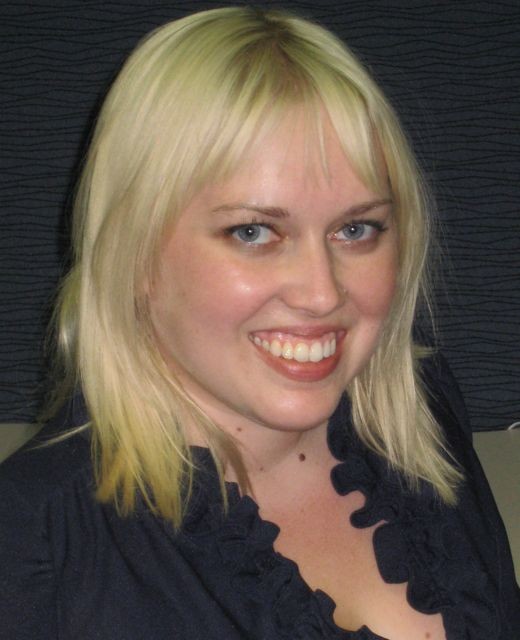Democratic National Convention 2012
Wednesday, November 9, 2011
Democratic National Convention 2012 Democratic National Convention 2012 Notebook: Young campaign vet unveils Charlotte imprint on DNC merch
Posted By Mary C. Curtis on Wed, Nov 9, 2011 at 11:23 AM
Bateman is part of the team charged with raising $36.65 million for the 2012 convention without corporate cash or individual donations more than $100,000 (though Duke Energy has guaranteed a $10 million line of credit). She's responsible for the merchandise (she worked with designer Dawn Kussman of Fayetteville) as well as a just-ended contest with the prize of airfare and hotel during convention week for those who signed up online at www.charlottein2012.com for updates. And she oversees events designed to draw in donors.
“I like being in politics. I like the fast pace of it. I like being able to move around and meet so many people,” Bateman said. “I’m good at it.” Since the DNC kick-off event in September, the host committee has signed up 100,000 people across every state.
Bateman was one of those high-schoolers who, as part of a youth-in-government program, traveled to her state capital for a weekend of mock legislating. Her activism became real in 2005 when she was a student at the University of Wisconsin in Madison and heard that Tim Walz, her former global studies teacher and a retired Command Sergeant Major in the Army National Guard, was challenging a 12-year incumbent to represent her largely rural home district in the U.S. Congress.
“I honestly wanted to do communications,” she said, but a friend told her, “‘No, I’ve got that job.’” Fundraising wasn’t filled yet. “So I sent in my resume and I called him and he called me back, and he was, like, ‘Have you ever fundraised before?’ and I was, like, a little. I’ve been to a couple of fundraisers.
“That’s the beauty of working for a first-time candidate," Bateman said. "The communications director was a first-time communications director. We were all incredibly green — which was kind of the beautiful thing about the whole campaign,” she said. “I remember the day we got our first $1,000 contribution.”
Thursday, November 3, 2011
Democratic National Convention 2012 Democratic National Convention 2012 Notebook: President's top adviser speaks at Governor's conference in Charlotte
Posted By Mary C. Curtis on Thu, Nov 3, 2011 at 11:49 AM
Gov. Bev Perdue said in her official hello to the North Carolina Governor’s Conference for Women that the event was a chance for women from across the state to “trade ideas…in a welcoming and energized atmosphere.” (At the very least, it gave the governor a chance to name preceding speaker Terry McMillan’s How Stella Got Her Groove Back as one of Perdue's "favorite books.”)
But Wednesday’s daylong event went beyond workshops on topics including finance and self-esteem, despite the “Power Up, Power On!” slogan. It was a chance for President Obama’s senior adviser Valerie Jarrett to give the keynote luncheon speech and become the latest member of the administration to offer North Carolina some love. One of the first lines of every visitor here is invariably: “It’s nice to be outside of Washington, D.C.” And wasn’t it also nice that the latest edition of the conference landed in Charlotte, site of the 2012 Democratic National Convention?
After praising Gov. Perdue, the state’s first woman governor, for being a “passionate” advocate and fighting “tirelessly” for North Carolinians, Jarrett reminded the sold-out audience of 1,500 that Obama, at the start of his time in office, signed the Lilly Ledbetter Fair Pay Act and has also appointed two women to the Supreme Court.
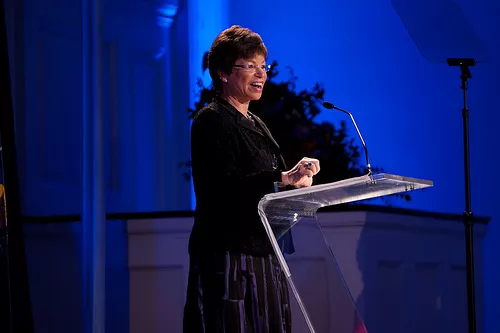
Wednesday, October 26, 2011
Democratic National Convention 2012 Democratic National Convention 2012 Notebook: Remodeling Charlotte, one contract at a time
Posted By Mary C. Curtis on Wed, Oct 26, 2011 at 1:23 PM
When the Democratic National Convention Committee pointed businesses to www.charlottein2012.com, Robyn Hamilton, host committee director of business relations, called it the “go-to mechanism” for anyone who wanted to get involved or sign into its vendor directory. Now that Democratic National Convention Committee officials have awarded $7 million in convention-related contracts, that site is where local businesses can go for subcontracting opportunities.
There should be plenty of them, as partnerships of local and out-of-state companies work to modify and restore Time Warner Cable Arena for next September’s convention and provide services for staff and media using the Charlotte Convention Center.
On Tuesday, convention CEO Steve Kerrigan said the firms represent “the best of the Carolinas and the diversity of America.” Kerrigan said local employment was “a priority,” and emphasized the DNC’s record of working with women, minority and disability-owned businesses and union labor, but said it didn’t “set quotas.” He called Mayor Anthony Foxx — who was close by during the announcement at the arena — a “great ally to have.”
The construction manager will be a partnership among Charlotte-based Rodgers Builders, Inc., Hunt Construction Group, which built the arena, and Atlanta-based H.J. Russell and Company, the country’s fourth-largest minority owned business. Rodgers president and CEO Pat Rodgers said there would be mentoring opportunities to get young people involved.
The event architect contract will be a partnership between Populous and Neighboring Concepts of Charlotte, a minority-owned company that has partnered on projects such as the Gantt center and the LYNX Blue Line. Hargrove, Inc. is partnering with Charlotte-based McFarland Corbitt as exposition and event services provider.
The participation of union labor and minority businesses will be a continuing subject of discussion and scrutiny as contracts are awarded. Last week, South Carolina’s Democratic Congressman James Clyburn — in town for a Congressional Black Caucus event — told me after he toured the arena that one reason the CBC visited Charlotte was to make sure diverse businesses are part of the process and that everyone “had a fair chance.”
On Wednesday, Scott Stone, the businessman who is Foxx’s GOP opponent in the fall mayoral race, was scheduled to hold a press conference outside the convention host committee headquarters to question the role of union labor in contracts. In a letter to host committee chair Dan Murrey and copied to Foxx, dated Oct. 26, Stone said he and "fellow citizens across Charlotte…remain troubled by the provision of the contracts which require all vendors sign a Project Labor Agreement.
"For the good of our city and to ensure transparency within this process, I am formally and respectfully requesting that the DNC Host Committee release a copy of any and all Project Labor Agreements that vendors will be required to sign," Stone's letter continued. "Charlotteans are proud to live and work in a Right to Work state. However, Project Labor Agreements, like the one the DNC will require, can often set dangerous requirements which push workers toward unions, increase costs, or make it more difficult for local employees to participate in the projects.”
The next big contract — in case anyone is interested in putting in a bid — is to provide “housing services,” with details at the Democratic convention website. Due date for a proposal is Nov. 8.
Mary C. Curtis, an award-winning Charlotte, N.C.-based journalist, is a contributor to The Root, NPR, Creative Loafing and the Nieman Watchdog blog. Her “Keeping It Positive” segment airs Wednesdays at 7:10 on TV’s Fox News Rising Charlotte, and she was national correspondent for Politics Daily. Follow her on Twitter.
Tuesday, October 18, 2011
Democratic National Convention 2012 Democratic National Convention 2012 Notebook: Small N.C. towns get some love
Posted By Mary C. Curtis on Tue, Oct 18, 2011 at 12:54 PM
You can’t say President Obama isn’t optimistic. Though Mecklenburg County — Charlotte, in particular — made the difference in his narrow North Carolina victory in 2008, the president this week brought his bus tour to the state’s smaller towns. Why does he keep returning? It’s the people, he said. “They are gracious and they are kind, and even the folks who don't vote for me are nice.” With a year of battles with Congress and a tough 2012 race ahead of him, those people are also very important. Next September will find the president in the friendlier climate of Charlotte for the Democratic Convention, but for now he's venturing into areas such as Wilkes County, where John McCain piled up a big majority in 2008.
At a packed West Wilkes High School gym in Millers Creek on Monday, Obama touted his American Jobs Act, which he said he will chop into “bite-sized pieces” now that the total $447 billion package was rejected by Congress. “If they vote against these proposals, if they vote against taking steps that we know will put Americans back to work,” he said, “they’ve got to explain not to me, but to you, why they’re doing it.”
The president focused on education and the federal funds that helped schools like West Wilkes when local and state money disappeared. That point was driven home in his introduction by superintendent Steven Laws, who thanked the president for the more than $6 million in the first stimulus package that helped county schools; despite cutbacks, Laws said, he hasn’t had to lay off one person.
The scene was a movie-like picture of small-town America, with its draped flags and performances by dancers and the school band, and a soundtrack of “Yankee Doodle Dandy” and “America the Beautiful” with some in the crowd of about 2,000 singing along. (Democrats are not going to concede values of patriotism and community pride.)
But struggles haven’t escaped the peaceful setting. Toni Boles, waiting in line to hear the president she supports, lost her office manager job two years ago when her company closed; her unemployment benefits are running out. “He’s really doing the best job, considering what he’s been left with,” said the 36-year-old from Roaring River, N.C. After his speech, Boles said the president gave her “clarity on what the jobs bill entailed.” She said she realized he will have to compromise but hoped “key provisions” that will help those who are struggling can be kept intact. Boles’ parents, who live on Red, White and Blue Road, stood with her. Her mother, Kay Walker is retired from the Tyson factory; dad Ray Walker said “if the Congress works with him a little, this country would progress.”
That doesn’t seem likely. Even this presidential tour — with a route that started in Asheville and ends in another battleground state, Virginia — had Democratic and Republican officials arguing whether or not it should be considered a campaign trip.
Tuesday, October 11, 2011
Democratic National Convention 2012 Democratic National Convention 2012 Notebook: State delegations give Charlotte the once-over
Posted By Mary C. Curtis on Tue, Oct 11, 2011 at 10:10 AM
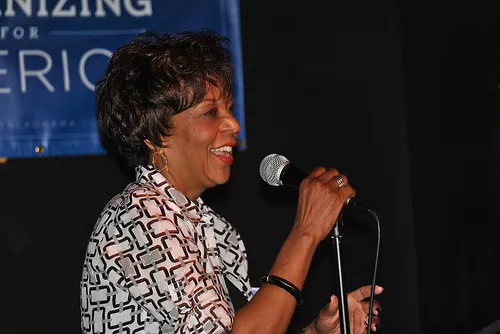
- Photo by Edward Kimmel
- Maryland Democratic Party chair (and Charlotte native) Yvette Lewis
To most visiting state representatives, it was a tour of meeting rooms and suites (though not the ones with the nice Jacuzzis), a chance to sit on beds, peer at views of ponds and paddle boats and ask about the location of the nearest drug store. For Yvette Lewis, it was a chance to show off her hometown, and it was “emotional,” she said. “It’s a good day,” Lewis said on Monday after a walk through the Hilton Charlotte University Place.
Lewis is chair of the Maryland Democratic Party and a super delegate. She's in Charlotte Oct. 9 through 11 to scout 2012 convention accommodations for her state’s 112-member delegation. In that task, she was much like her fellow three dozen representatives from 14 states, entertaining visions of 2012 breakfast meetings and receptions. But Lewis is also a Charlotte native — a self-described “kid who grew up on Lasalle” — a graduate of Charlotte Catholic High School, and a frequent visitor. Her parents, sister, brother and other family members live here, and Lewis — an opera singer — has brought her opera immersion program for children to elementary schools such as Eastover and Dilworth.
“I always thought that Charlotte was great; now everybody else gets to see why,” she told me. It was nice, she said, to hear her executive director say, “Your hometown is very cool.”
The University-area stop came the day after a visit to the U.S. National Whitewater Center; an event at the Speedway was to come. They had toured Time Warner Cable Arena and heard from Mayor Anthony Foxx and former Mayor Harvey Gantt. Up to 6,500 delegates will be a part of the Democratic National Convention in Charlotte in September 2012. While the convention committee secures the hotel space, delegates and state parties pay.
This first scouting trip was also scheduled to take visitors to SouthPark, Uptown and Concord, with I-77/airport hotels put on hold for another time. During the convention, shuttle buses will transport attendees to Time Warner Cable Arena, the site of the convention. Veterans of other conventions viewed prospective 15-minute bus rides as fairly painless; businesses are happy to be sharing the revenue. After states rank their top three hotel zones and indicate a preference for premium, moderate or economy accommodations, the DNCC will make the match.
David Glass, general manager of the Hilton, was flanked by representatives of other area hotels, and he extolled the virtues of a setting “out of the security check points and street closings.” Party politics don’t matter to him. If “the money is green,” he told me, “people are welcome.”
Lewis, who will be attending her third national convention, didn’t mind talking politics in between test squeezes on a hotel room pillow. “Obama’s chances are great in 2012.” Republicans are fighting every one of the president’s proposals, not because they are afraid they won’t work, she said, but because “they are afraid they will.”
Debi Hartmann, executive director of the party in Hawaii, said the president “is now where he’s needed to be for a long time,” confronting and answering questions. “He’s not going to settle for anything less.” She said voters “need to continue to hear the successes of his administration,” and listed health care for older children as an issue that’s not Democratic or Republican. She said watching GOP “infighting” is “kind of fun.”
It will be the first convention for John Murakami of Honolulu, who as state convention director must accommodate 37 delegates. He last visited Charlotte 15 years ago, and said he was “pleasantly surprised” by the city’s growth, from the EpiCentre to the light rail that will take delegates from the arena to the convention center.
Because Hawaii has no majority race or ethnicity, Murakami said the delegation is focusing its diversity effort on the “weird, interesting concept” of, as Hartmann put it, making the convention experience “hip enough yet comfortable enough” for its younger and older members. In Hawaii’s spirit of giving back, they said, representatives will come with gifts of Kona coffee, shortbread chocolate cookies and macadamia nuts.
Sounds like visitors Charlotteans can warm up to.
Mary C. Curtis, an award-winning Charlotte, N.C.-based journalist, is a contributor to The Root, NPR, Creative Loafing and the Nieman Watchdog blog. Her “Keeping It Positive” segment airs Wednesdays at 7:10 on TV’s Fox News Rising Charlotte, and she was national correspondent for Politics Daily. Follow her on Twitter.
Tuesday, October 4, 2011
Democratic National Convention 2012 Democratic National Convention 2012 Notebook: Party visitors offer starkly different views of government
Posted By Mary C. Curtis on Tue, Oct 4, 2011 at 2:31 PM
It was a tale of two visions of government. And when politicians from both parties came through Charlotte with plans on what it’s going to take to get the country back to work, the difference was stark.
This week saw the arrival of Democrats Martin O'Malley, governor of Maryland, and Deval Patrick, governor of Massachusetts. Last week two GOP hopefuls, Texas Gov. Rick Perry and U.S. Congresswoman Michele Bachmann of Minnesota, passed through town.
After touring the Time Warner Cable Arena on Monday, O’Malley and Patrick were enthusiastic about Charlotte’s preparations for the 2012 Democratic convention and their candidates.
Fresh off appearances on Sunday talk shows, the pair came to town for a two-day conference on the new economy and emerging technologies, presented by the Democratic Governors Association and the Center for Innovative Policy and hosted by North Carolina Gov. Bev Perdue, who skipped the tour.
DGA chair O’Malley said the convention is “going to be very grassroots oriented” and interactive, and repeated the DNC’s narrative that it will showcase “the way North Carolina is re-creating its economy.”
When I asked Patrick how the party will energize voters who turned out in the state and across the country to elect President Obama in 2008 — including young people, independents and African Americans — he told me: “Nobody is taking this election for granted and we shouldn’t take it for granted. I say to Democrats who are nervous, ‘Good, good,’ because that edge is important for us. It means we have to get out there and work. It means we have to make the case to people.”
He and O’Malley — who urged support of the president’s jobs bill — said Democrats and Republicans present starkly different views of America, its challenges and how to confront them. The Democratic Party believes, Patrick said, “that we have some responsibility to each other. Not that government can solve every problem in everybody’s life, but that government has a role to play in helping people help themselves.”
The difference was on view last week when Perry and visited Charlotte, which is close enough to South Carolina and its primary scheduled for Jan. 21. “Government doesn’t create jobs; the private sector creates jobs,” Bachmann said after a meeting with the Charlotte Chamber, which does not endorse and has invited candidates from both parties to speak. Bachmann said that it’s the Federal government’s duty to “provide for the safety and security of the American people.”
The Chamber and the city needn’t worry about attracting newsmakers. As the election and DNC 2012 approach, Charlotte is sure to see more from a parade of candidates and officials with competing messages. What we may not see is common ground.
Mary C. Curtis, an award-winning Charlotte, N.C.-based journalist, is a contributor to The Root, NPR, Creative Loafing and the Nieman Watchdog blog. Her “Keeping It Positive” segment airs Wednesdays at 7:10 on TV’s Fox News Rising Charlotte, and she was national correspondent for Politics Daily. Follow her on Twitter.
Wednesday, September 28, 2011
Democratic National Convention 2012 Democratic National Convention 2012 Notebook: A balance of politics and business
Posted By Mary C. Curtis on Wed, Sep 28, 2011 at 10:07 AM
With visions of economic gain and a burnished international profile, the city of Charlotte is graciously extending a bipartisan business welcome to the 2012 Democratic National Convention. That was the message at the Chamber office on Tuesday with the announcement by the Committee for Charlotte in 2012 of host and steering committee members. To be sure, the list is weighted with Democratic politicians and officials. But a smattering of Republican names conveys the message that partisan bickering isn’t a part of the package. (One of them, city council member Andy Dulin, said he wants a “safe and profitable convention,” with visitors who “spend a lot of money” and then “are disappointed in November.” He was smiling, sort of.)
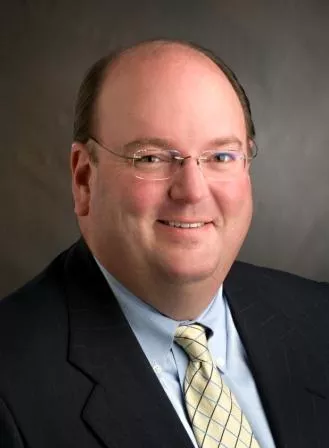
Murrey said the convention will need 10,000 to 12,000 volunteers. Christy Kluesner has already stepped up. Kluesner, who has worked in development for small government agencies and nonprofits, said she wants visitors to know her Charlotte: a place “with creative energy and the willingness to try new things.” She also wants President Obama, whom she supports, to emphasize what he’s accomplished “despite challenges.”
It was a by-the-numbers rundown on Monday, with Murrey’s big one being the close to $37 million needed for the convention. (The host committee isn’t talking about how much it’s raised so far.) “People have the opportunity to feel like this is their convention,” he said.
Kerrigan’s numbers included the shade over 14,000 votes that was Obama’s slim margin in North Carolina and the state’s 15 electoral votes. “How do we engage folks in this community, in this state,” and across the country? he asked.
A confident Cotham told me her thoughts on Obama’s chances: “Yes, he’s going to win North Carolina.” A host committee member, who was at Tuesday’s event as well, Cotham has been speaking to Democrats in outlying counties to get them involved in what’s happening in Charlotte. “We all know how this works,” she told me at Monday’s forum. “Our people are the ones who are most affected by the economy….There are people here today who are homeless. There are people here today who don’t have jobs and can’t afford the $10 dollars for lunch, and I never turn anybody away.
“Don’t you underestimate the Democrats. They will come out strong," Cotham said.
Chairing the host committee, which is tasked with engaging the public in convention activities, are Charlotte Mayor Anthony Foxx and Duke Energy CEO Jim Rogers. North Carolina Gov. Bev Perdue and Sen. Kay Hagan were named honorary co-chairs. Former Mayor Harvey Gantt chairs the smaller steering committee, whose members “will bring the hopes and concerns of their constituencies to our discussion.” Honorary co-chairs are former Gov. Jim Hunt and former Bank of America CEO Hugh McColl. Committee members serve as unpaid volunteers.
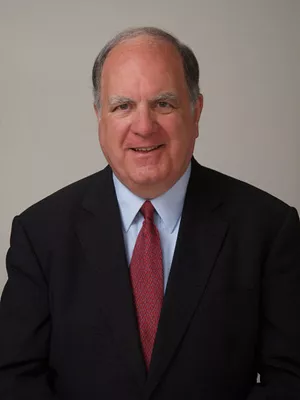
And while he’s concentrating on his new convention role, Spratt did admit he “would love to be in the fray” in Washington right now. “To resolve the problems, we need Democrats and Republicans putting hands on the plow, leaning in the same direction,” he told me. He said that President Obama was confronted with unprecedented economic challenges when he was sworn in. “If he can make his case and it catches on here,” Spratt said, “it will be a good litmus test for the rest of the country.”
Mary C. Curtis, an award-winning Charlotte, N.C.-based journalist, is a contributor to The Root, NPR, Creative Loafing and the Nieman Watchdog blog. Her “Keeping It Positive” segment airs Wednesdays at 7:10 on TV’s Fox News Rising Charlotte, and she was national correspondent for Politics Daily. Follow her on Twitter. http://twitter.com/mcurtisnc3
Friday, September 23, 2011
Democratic National Convention 2012 Democratic National Convention 2012 Notebook: Getting down to business in Charlotte
Posted By Mary C. Curtis on Fri, Sep 23, 2011 at 10:50 AM
Each week brings another chance for Charlotte companies to compete against — and perhaps join in partnership with — regional and national businesses for DNC 2012 opportunities. Especially in a tough economy, the possibility of major contracts takes precedence over politics for many.
This week, the Democratic National Convention Committee opened the bidding for “an exposition services vendor.” That’s the bureaucratic name for the firm responsible for outfitting the work spaces for convention and campaign staff and media in the Time Warner Cable Arena, the Charlotte Convention Center and other places around town.
Last week, the DNCC released a request for proposal (or RFP) for “an event architect and construction manager,” charged with the big job of designing and modifying the arena in preparation for the convention. And someone will eventually have to design a stage set that is suitably presidential.
The DNCC said it will judge proposals “on numerous criteria, including, but not limited to: experience, reliability, relationships to Charlotte, N.C., and the surrounding region, participation of union labor, women, minorities and persons with disabilities, and local resources to support the endeavor.”
In right-to-work North Carolina, union participation in convention projects has been a part of the discussion since the beginning, with some national unions objecting to the Charlotte pick. Opposing them are state unions that see opportunities for their members, while some non-union businesses worry about being left out.
The forms and deadlines for the work are listed on the convention’s official site, which is also the home of the vendor directory, launched on Sept. 1. So far, more than 1,200 non-convention related events are expected when the more than 35,000 delegates, politicians, celebrities and members of the media come to town.
On Wednesday night, members of the host committee, including CEO Dan Murrey, met with the Carolina Regional Minority Partnership Coalition, minority businesses whose Website also includes a vendor list.
Coalition chair James Ferguson told me that their closed-to-the-press meeting at the historic Excelsior Club was “mainly just an informational session.” He said, “It’s important to get as much information as possible so our members can fully participate in the process.”
“The one thing that’s not clear,” he said, “is how they will monitor and measure their progress and success. We can help.”
Mary C. Curtis, an award-winning Charlotte, N.C.-based journalist, is a contributor to The Root, NPR, Creative Loafing and the Nieman Watchdog blog. Her “Keeping It Positive” segment airs Wednesdays at 7:10 on TV’s Fox News Rising Charlotte, and she was national correspondent for Politics Daily. Follow her on Twitter.
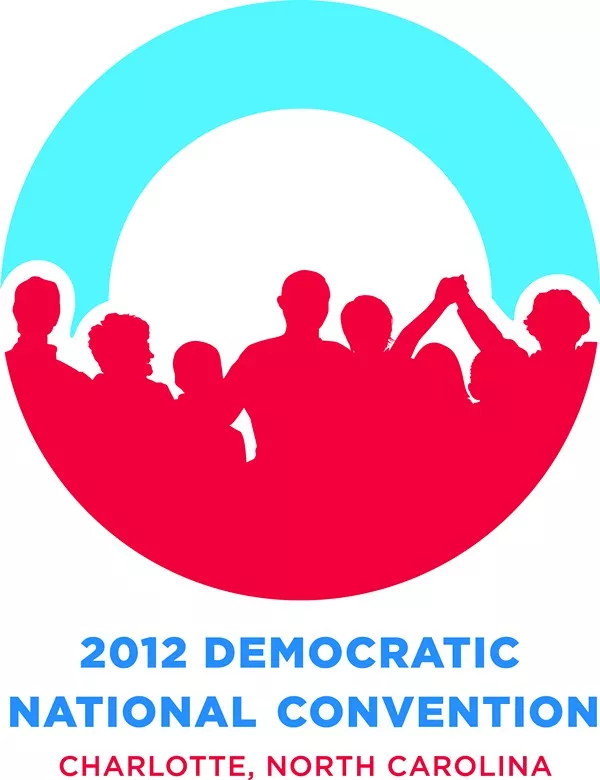
Wednesday, September 7, 2011
Democratic National Convention 2012 Democratic National Convention 2012 Notebook: Kickoff rallies enthusiasm for convention, a tough 2012 election
Posted By Mary C. Curtis on Wed, Sep 7, 2011 at 7:33 AM
Shouts of “Yes, we can” — with the updated addition, “do it again.” Noisy supporters shoulder to shoulder. The Livingstone College marching band blaring upbeat tunes. And chants of a phrase I had not heard in awhile: “Fired up; ready to go.”
All the Democratic Party has to do is transfer the spirit of its Charlotte national convention kickoff to its voting base. That’s going to be tough given the polls showing the electorate’s distaste for all that is Washington. But the scene on Tuesday in the concourse of Time Warner Cable Arena recalled an earlier political time as the party looks one year forward to its national convention.
The crowd, estimated at about 2,000, came out despite a storm threat to hear DNC Chair Debbie Wasserman Schultz praise Charlotte, the city that “didn’t take ‘no’ for an answer” when competing to win the convention. “Now it’s time to show the rest of the country and the rest of the world … that Charlotte is a world-class city,” she said, using that descriptor without the trace of irony you sometimes detect in long-time Charlotteans. She connected the city — its story of “strengthening and diversifying” through investments in education, technology, research and development — to the narrative of the Democratic Party.
Thursday, September 1, 2011
Democratic National Convention 2012 Democratic National Convention 2012 Notebook: ‘Robust’ vendor directory to live long past the convention, says DNCC chief
Posted By Mary C. Curtis on Thu, Sep 1, 2011 at 5:30 PM
It’s not the first website to ask local and regional businesses to sign up for a chance to connect with 2012 Democratic convention opportunities. But, according to Robyn Hamilton, host committee director of business relations, “it’s important that businesses go to this directory.” She called www.charlottein2012.com the “go-to mechanism” for the host committee and the DNCC. When I asked if pressure by minority and other local businesses had anything to do with the fanfare of the official site launch on Thursday, she told me, “I don’t need any nudging.”
Steve Kerrigan, the CEO of the Democratic National Convention Committee, led the host committee for the 2004 convention in Boston. He said this set-up “far exceeds” anything done for past conventions.
Dan Murrey said this “important piece of the puzzle” was the “first directive I got” after the DNC picked Charlotte as the site of the 2012 convention and he was chosen to be host committee CEO. “It’s important because this community needs to see opportunities that are created.” Charlotte is investing a lot of time, energy and resources, he said.



